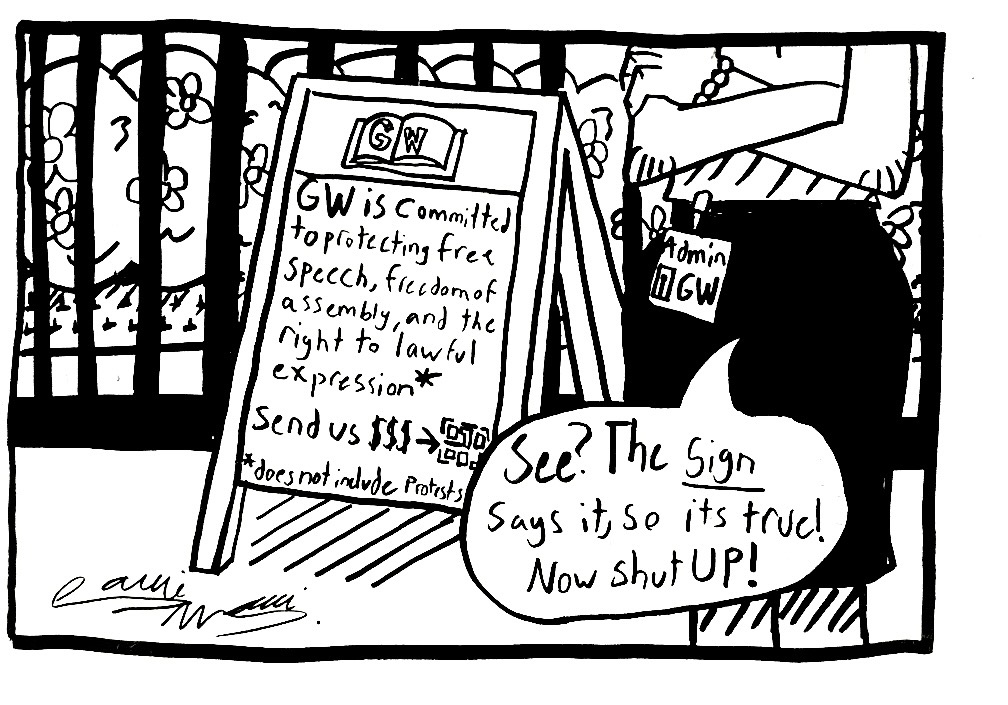
I’ve always been an introvert. It takes me a while to get comfortable enough to speak around a new group of people. I can’t go up to someone I don’t know and simply start talking. I’ll never go to a party if I’m not close friends with anyone there. I’m often reluctant to participate in many of my classes.
When it comes to raising my hand in class, I don’t always have a choice. As all students know, a lot of classes – especially at a school with a small-average class size like GW – have a participation requirement. But I don’t think it’s always fair to force students to speak up.

The reasons behind mandating class participation make sense. Professors don’t want to have to look out at a group of students staring blankly into space, and enforcing participation can be a method of ensuring that students are doing the readings. And of course, being able to articulate an idea in a classroom setting is an important skill for students to have.
But in reality, forcing class participation doesn’t always work the way we might hope.
It’s important for professors to realize that when they put the pressure on students to participate, there’s always at least one person like me in any class: stressed, anxious and annoyed that if they don’t raise their hand soon, they’ll be penalized. I don’t think any professor aims to increase their students’ stress levels in this way – but they do. Constantly worrying about when and how to raise your hand to fit in a comment doesn’t create an environment conducive to learning.
Janet Steele, a journalism professor, said that for her, participation is about attitude and attendance.
“There are some students who have a lot to say in class, and they are a great blessing,” Steele said in an email. “However, I realize that there are other students who are shy, and for various reasons don’t like to speak out in class. So as long as they are there and engaged, that’s fine.”
Participation does not equal engagement. Many students are perfectly capable of listening and engaging with material while still sitting quietly and absorbing information. I may not be the first to raise my hand in a discussion, but I still keep up with readings, do my assignments and work hard on papers.
Professors should recognize that vocalizing a thought isn’t the only way to engage in class and stop trying to force students out of their comfort zones to speak. Other forms of engagement – like taking careful notes, visiting office hours or emailing questions to the professor – should be just as valuable. And exams and essays are a sufficient way for professors to gain their students’ understanding.
Some discussion-oriented classes I’ve taken during my time at GW have been about sensitive topics like race, sexuality and women’s issues. And those topics are so difficult to parse out that they require discussion that brings up varied opinions and perspectives. But I’m uncomfortable with the idea of forcing students to speak up in classes like these.
Many students have personal connections to issues like race, sexuality or violence, or they may not feel they have the authority to speak on such complicated issues. In those classes, staying quiet may be a form of protection, rather than the result of laziness or apathy.
It isn’t fair for a professor to assume that, because a student doesn’t speak, they don’t care or they didn’t read. Sometimes, the dynamic of a classroom just doesn’t allow for everyone to participate. In any discussion, there’s at least one classroom dominator, someone whose hand goes up every time the professor asks a question or pauses to take a breath. And while that learning style may work well for some, it makes it harder for others to chime in.
And those who participate too often aren’t always making a valuable contribution to the conversation. They might bring up personal stories, veer off topic or even answer a question incorrectly. But students are paying a lot of money to attend GW and learn from experienced professors – not listen to classmates’ stories or wrong answers.
If a professor doesn’t correct students who have given incorrect information or guide the conversation back to a relevant topic, then the discussion is no longer useful. And students shouldn’t be forced to participate in a meaningless conversation.
Ultimately, some students simply are not outgoing, and won’t raise their hands. One prevailing theory is that by forcing introverts to talk, teachers and professors can change them, and help them feel comfortable speaking off the cuff. But as an introvert who has heard, “Hopefully I can get you out of your shell,” on the first day of every semester, I can promise that doesn’t work.
Jeffrey Richter, a history professor, uses half of his class sessions for discussions, and asks that each student speaks during those sessions. Some students don’t mind, but others find it “awkward or pressure-inducing,” Richter said in an email.
“I want to know what each one of them thinks, and I want to provide everyone with a strong incentive to complete the reading assignment before class,” Richter said.
Of course, there’s an undeniable value in classroom discussions, since they allow students to explore others’ ideas and perspectives. They also give professors a chance to evaluate what students are interested in, and what they understand. I wouldn’t want every class at GW to be a strict lecture, as that would get boring pretty quickly.
I understand that all of my professors are intelligent and well-meaning and want the best for their students. They know a lot more about the world than I do. But they can’t change an introvert’s quiet tendencies overnight – and they shouldn’t try to.
Sarah Blugis, a senior majoring in political communication, is The Hatchet’s opinions editor. Want to respond to this piece? Submit a letter to the editor.




